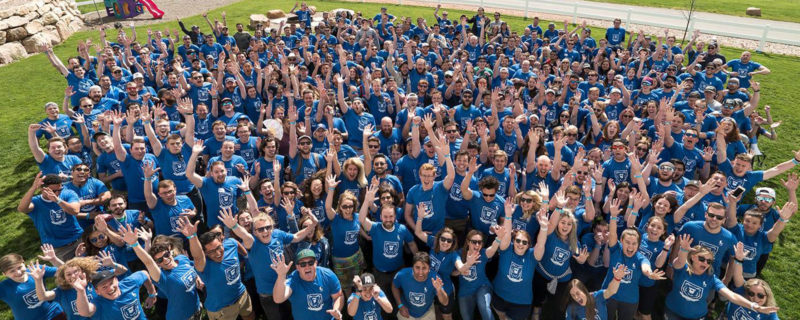Note: This article is part of a series providing updates from companies that received an EDTIF tax credit. Our office has an ongoing partnership, through a post-performance incentive, with the company. The story is the company’s narrative and may not reflect the methodology of standardized legislative reporting requirements published in our Annual Report. We do not certify or independently verify any company’s data as part of this ‘Where are they now?’ series.
Just over 10 years ago, Lucid , opens in a new tab officially launched its flagship product, Lucidchart, from a student apartment in Provo, Utah. Karl Sun, a former leader at Google, moved to Utah and met Ben Dilts, Lucid’s chief technology officer and co-founder, at a speed pitching event where entrepreneurs with an idea cycled through tables with potential angel investors.
At the event, Sun was introduced to an early working version of Lucidchart Dilts built. He was so impressed and recognized this collaborative product solved an industry-wide need. Sun knew he wanted to be a part of bringing this product to the world, so he signed on, and he and Dilts started building a company.
Lucid provides a suite of products that help teams see and build the future through visual collaboration. Its products, Lucidchart, Lucidpress, and its newest product, Lucidspark, have over 30 million users worldwide, including customers like Google, General Electric, NBC Universal, Johnson & Johnson, and 99% of the Fortune 500.
“When we first started in 2010, the landscape in Utah was very different than it is today,” said Sun. “There were some big tech pioneers who set the tone locally, but there were very few big tech companies in the area.”
Some seed round investors didn’t want to invest unless we moved to California, noted Sun. But we found some incredible investors who had the confidence in us and invested in us as a Utah company.
Despite the challenges brought on by a global pandemic, the company experienced unprecedented growth in 2020. In April, Lucid closed a $52 million round of funding and announced it passed $100 million in annual recurring revenue.
With the rise of remote workforces, Lucid also saw an opportunity to enable cross-team collaboration that had been disrupted with individuals working from home. The company recognized the importance of bringing teams together into a shared space to work together and launched Lucidspark in October 2020.
Lucidspark is a cloud-based virtual whiteboard that enables teams to brainstorm and collaborate on new ideas and organize collective thinking into actionable next steps, whether together or remotely. It’s a profitable addition to Lucid’s visual collaboration suite and helps the company further execute its mission.
The company ended the year with several business and culture accolades, including landing on the coveted Forbes Cloud 100 , opens in a new tab list. The company was also named one of the 2020 Best Workplaces in Technology , opens in a new tab by Great Place to Work and Fortune. Also, Lucid was named Top 20 on both Utah Business Magazine’s Fast 50 , opens in a new tab list and MountainWest Capital Network’s Annual 100 , opens in a new tab list as one of the fastest-growing companies in the state.
Lucid has over 700 employees, with a majority based in its headquarters in South Jordan, Utah. It also has two international offices in Amsterdam and Melbourne, Australia.
“It’s exciting to see how the Utah IT ecosystem and industry have grown in the last 10 years, and we’re proud to be a part of it,” Sun said.


